The Wildlife Trusts want to see greenhouse gas emissions rapidly decrease with nature’s recovery at the heart of increased ambition on climate both in the UK and globally. There must be significant focus on both mitigation and adaptation.
The Wildlife Trusts have identified 10 areas of focus:
1. Keep 1.5 alive – act and adapt
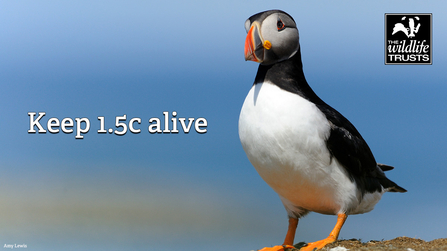
- We need to keep 1.5 alive using clear evidence-based plans and national policies from all countries to combat and adapt to climate change, with continual monitoring of progress to ensure we restrict global warming to 1.5 degrees.
- Even fresh ambition to limit climate change at COP26 still falls far short of 1.5°C goal (Climate Action Tracker). We need ratcheted country ambitions as soon as possible. Though we welcome the call for this in the draft cover text by the end of 2022, we urge this is achieved sooner.
- Converting these into action is critical and implementing the proposal to increase reporting frequency on Nationally Determined Contributions progress to an annual cycle is a positive step to maintain momentum.
- We welcome the placeholder for a global adaptation goal in the cover text (CMA text).
2. Net zero is not the destination
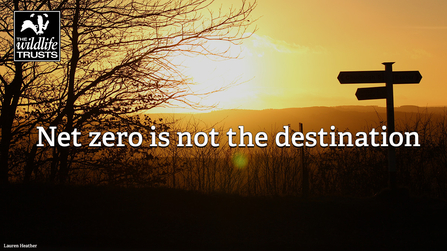
- We need to go beyond net zero to avoid the worst tipping points in the climate system. Nature has a critical role in removing carbon from the atmosphere, especially so after 2050, to balance out remaining greenhouse gas emissions. Because of the time it takes nature to recover, we need significant investment to restore nature at scale now. Using nature to repair the climate is fundamental; and we can’t delay.
3. The global community must work together and finance climate action

- To restrict warming to 1.5 degrees, we need to work together. Governments must show leadership by embedding climate justice in all decision making, whilst supporting the global scientific community to work together to find solutions to the climate crisis and supporting society to reduce emissions. Society must change its behaviour, with businesses significantly cutting their emissions in the next decade and individuals making greener choices where this is possible.
- Climate action must be just. We must ensure developed nations, which have done more to cause the climate crisis, support developing nations and island states who have contributed the least but are the most vulnerable to the impacts of climate change. The right support must be in place for everyone to reduce their own emissions and adapt to climate change, including through nature-based solutions.
- The UK must play its fair share in supporting clean economic development and climate adaptation of poorer nations.
- G20 countries, including the UK, must urgently deliver the $100 billion of climate finance per year that was promised to developing countries, and scale up this provision.
- We welcome the UK Government’s additional pledge of almost £300 million to help the most vulnerable countries adapt to the impacts of climate change, but it cannot stop here. It must work alongside other members of G20 to provide accelerated finance to poorer nations for mitigation, adaptation, and loss and damage.
4. Virtually eliminate all greenhouse gas emissions
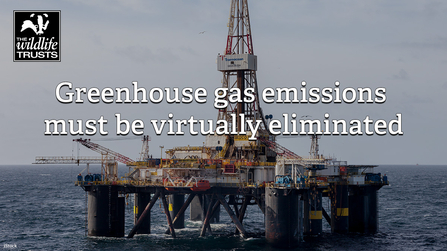
- We need to prioritise deep and rapid cuts in all greenhouse gases (e.g. NOx too).
- The 2020s is a critical decade over which this needs to occur, and initiatives need to be starting now, not mid-decade.
- The UK must now translate its commitments into action, on the domestic and global stage – delivering at least a 68% reduction in GHG emissions by 2030, increasing to over 78% reduction by 2035. And it needs a Budget that will enable this to genuinely help to tackle the inextricably linked climate and nature crises.
- Given its potent warming effect, nation pledges to cut methane emissions by 30% by 2030 are an important step in the right direction.
- In the UK, the energy, transport and agriculture sectors are key areas of focus for decarbonisation.
5. End all fossil fuels
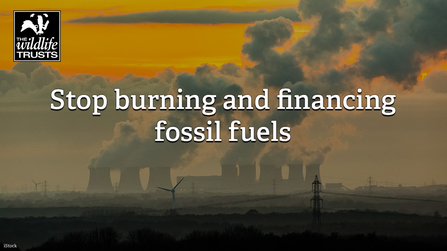
- All countries need to end the production and use of fossil fuels. This includes ending oil and gas exploration and production, with a just transition for people working in these industries.
- Commitments to phase out coal are welcome, but they must be backed up by action.
- In the UK coal currently accounts for <5% of electricity generated, but 23% of emissions. We need a ban on coal mining placed in energy National Policy Statements.
- We are pleased the phase out of fossil fuels is explicitly mentioned for the first time in the draft COP26 agreement - this is an important step forward for the formal text, though disappointing that the wording has weakened through revisions.
6. Make all agriculture and fishing nature and climate friendly
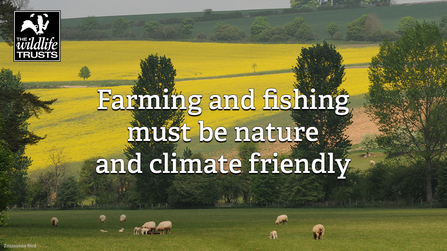
- Farmland accounts for 71% of land use in the UK and the agriculture sector accounts for 10% of the UK’s greenhouse gas emissions (dominated by methane and nitrous oxide which make up 54% and 32% of agricultural emissions, respectively). It is therefore essential the agricultural sector plays a prominent role in securing nature and climate recovery.
- We welcome the commitments of 26 nations to change their agricultural policies to become more sustainable and less polluting, and to invest in the science needed for sustainable agriculture and for protecting food supplies against climate change. But this is not enough, more countries must commit to ensure agriculture is sustainable.
- It’s imperative future payments for farmers and fishers support a fair transition to nature friendly practices.
- Government must support and incentivise sustainable land use practices through England's new Environmental Land Management (ELM) schemes – it is imperative that ELM schemes do not simply pay farmers to continue with business as usual.
- ELM schemes must enable land managers to improve biodiversity and ecosystems services on their land, embrace low-carbon and nature-friendly management practices, and support healthy, sustainable diets which are good for people and good for the planet.
- The Government must minimise contributions to climate change from fisheries and aquaculture, in line with the Fisheries Act’s climate change objective.
7. Embed nature and climate in land and marine management
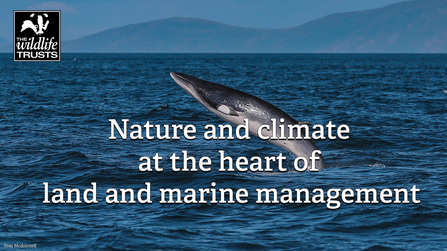
- Nature has come through stronger in the narrative of this COP, than any preceding. We applaud that this momentum has carried nature through to more prominent inclusion than ever before in the COP26 decision text. The draft text recognises the “interlinked global crises of climate change and biodiversity loss, and the critical role of protecting, conserving and restoring nature and ecosystems in delivering benefits for climate adaptation and mitigation, while ensuring social and environmental safeguards”, and explicitly references the findings of the IPCC Working Group I report.
- This momentum needs accelerating at the Convention on Biological Diversity in April-May 2022. All counties must sign up to 30x30 commitments, agreeing to protect 30% of the world’s land and 30% of global seas by 2030.
- We need the planning system to help address the climate and nature crises. A new Wildbelt designation in England would ensure that we go beyond protecting the nature we have now, to protecting the space nature needs for the future.
- We need to invest in high quality nature-based solutions that are designed, implemented and led by local communities for both climate mitigation and adaptation, nature and benefits to people.
- We need to map blue carbon stores and ensure we protect these, using strategic marine spatial planning that protects carbon stores and nature.
- We must enable nature’s recovery at sea, allowing nature to sequester more carbon in the future. 30% of our seas must be designated as Highly Protected Marine Areas and there must be greater protection for our wider seas, with sustainable fishing policies and strategic marine spatial planning.
8. End deforestation
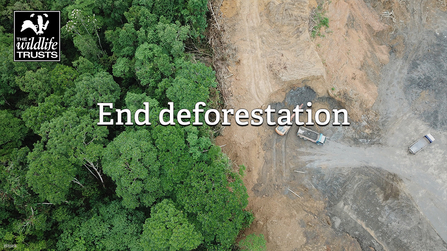
- We welcome commitments from over 100 countries to stop and reverse deforestation and land degradation by 2030 as an important step in the right direction, but we’ve heard it all before. We must ensure these commitments are met.
- We must ensure that commitments are made to amend past and future trade policies to ensure they do not drive deforestation and land degradation.
- Developed countries must tackle the consumption of products like meat, soy and palm oil that encourage deforestation in the global south.
9. Protect and restore peat
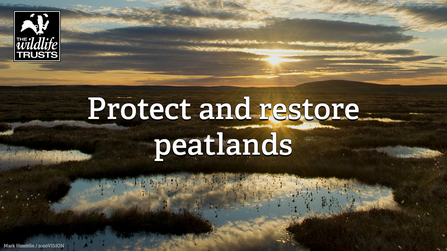
- The UK must protect and restore its peatlands, which are by far the country’s largest natural carbon sink – yet currently peatland is in such a degraded state it is emitting carbon, not storing it. To protect our peatlands carbon store, the Government must restore all upland peatlands by 2050, and at least a quarter of lowland peatlands by 2050, with the remainder of lowland peatlands brought into sustainable management.
- Whilst the UK has made some commitments for peatland restoration (England - all peatland in good condition by 2040; Wales - restoration of 600-800ha per year 2020-35; Scotland – restore 250,000 ha by 2030; N. Ireland – no commitment), these are far from enough. To even meet the UK’s current commitments for peatland restoration, it’s estimated there is a £560 million funding gap between committed spending and the spending required (Green Finance Institute, 2021). We welcome increased investment in peatland restoration, but funding and ambition continues to remain vastly insufficient. We need the Government to restore, protect and invest far more, both in terms of initial capital to reverse damage and long-term maintenance costs to fund ongoing management.
- The Government must ban the burning of vegetation on peat soils, intense agriculture, and drainage as well as the sale of horticultural peat compost.
10. Develop clean technologies in line with nature
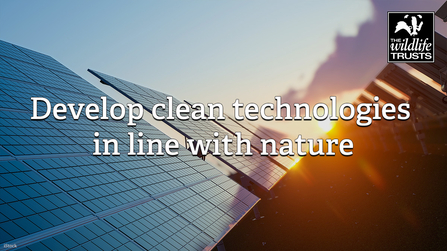
- If done badly, building endless offshore wind farms across huge swathes of our seas will damage our marine ecosystems. We need to see a much greater effort and investment being put into energy efficiency and energy saving, and renewable energy must be deployed in a way that helps restore nature. It should be innovative and diverse, and avoid over-reliance on any one technology to instil resilience in the system.
- We need ecological engineers that develop new, clean technologies that are environmentally friendly and community based.
- The UK Government should not rely on costly and speculative technologies, such as biomass with carbon capture and storage (BECCS) or Direct Air Capture and Storage (DACS), to meet its Net Zero and Carbon Budget Targets; these risk worsening climate change, displacing billions in climate investment, and significantly damaging the environment.

